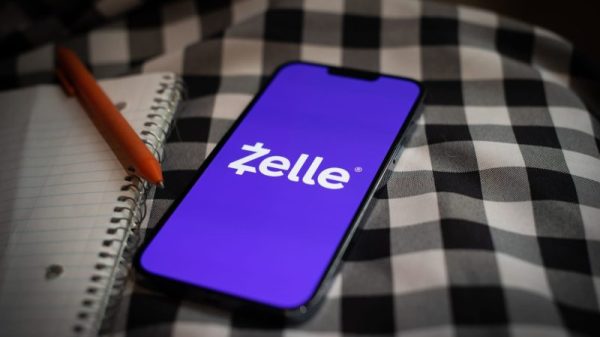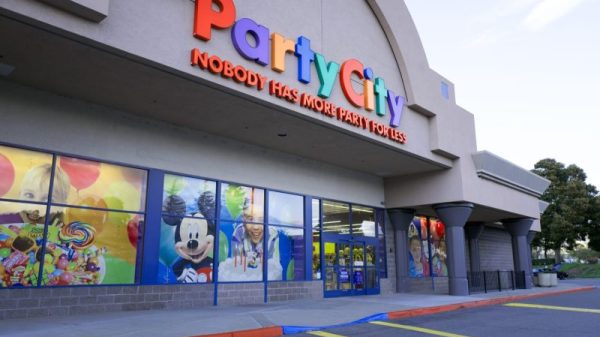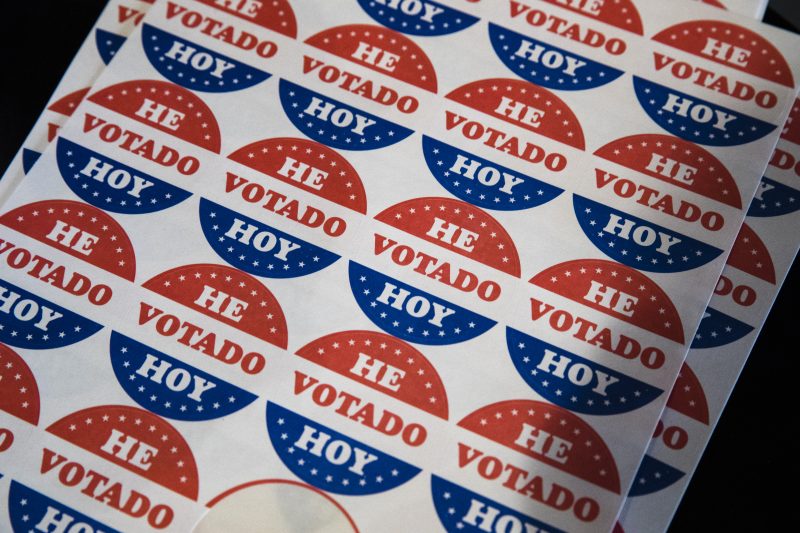Mayra Alejandra Rodriguez is used to seamlessly toggling between Spanish and English in conversation. If she doesn’t know the Spanish version of a word, she’ll use the English, and vice versa. The mishmash, known as Spanglish, comes naturally. Those around her understand her, at least most of the time.
The Silver Spring, Md., resident is the kind of young Hispanic voter attracting increasing attention from political operatives who advocate that campaigns use the blended language in advertising and other outreach as the 2024 election cycle accelerates.
The language — a portmanteau of English and Spanish that blends words, grammar and dialects from both tongues — is growing in popularity in the United States as the country’s Hispanic population grows. Currently, 19 percent of the U.S. population identifies as Hispanic, a new high according to the Pew Research Center, which also found that 63 percent of Hispanics in the United States speak Spanglish at least sometimes in their day-to-day life. Forty percent say they speak it often.
Operatives who are urging campaigns to reach young voters in Spanglish argue that its use not only reflects the nation’s changing demographics, but is also a way to meet voters with a lingo that feels more familiar and approachable.
For Rodriguez, Spanglish has proved handy in explaining to her father how U.S. elections work. He is about to become a U.S. citizen and, if the timing works, he’ll be able to cast his first votes in the next election.
“Especially now that my dad is in the process of becoming a U.S. citizen, it requires me to explain to him more things so he’s aware, whenever he does get the opportunity to vote for the first time,” Rodriguez said. “And my dad only speaks Spanish. So with him, the idea of Spanglish is very much real.”
While campaigns have used Spanish to target Hispanic voters for decades, Spanglish has made only sporadic appearances in political messaging.
For many young Latinos who grew up in bilingual homes in the United States, the mix of languages is something akin to a mother tongue. And the reality is, the U.S. political system has a vocabulary that at times can be difficult to translate to Spanish without sounding awkward or forced.
Words such as “vote” and “votar,” and “Senate” and “Senado,” sound and look similar enough in both languages. But more complex terms such as “caucus,” “comptroller” and “primary” don’t have such simple Spanish translations.
This is where Spanglish can come in handy, Rodriguez said. It makes explaining the complex world of American politics much easier.
“There’s times where I’m really trying to explain something to either of my parents, but because I just can’t find those technical words in Spanish, I have to resort to using English,” Rodriguez said.
Among those introducing Spanglish in their messaging is Bold PAC, the campaign arm of the Democratic-aligned Congressional Hispanic Caucus, which during last year’s campaign cycle encouraged now-Rep. Maxwell Frost (D-Fla.) to connect with voters using Spanglish alongside English and Spanish.
“If we are missing Spanglish, then we are missing a very big part of what it means to do outreach to Latinos,” said Bold PAC’s Executive Director Victoria McGroary.
For Frost, who is Latino and the first Gen Z member of Congress, using Spanglish in a campaign ad was a no-brainer.
The freshman congressman was raised in a Cuban American household, which means he’s always found himself seamlessly shifting between English and Spanish within the same sentence. He figured that Latinos who were raised in similarly multilingual households would feel represented by the use of Spanglish on his campaign advertisements “because that’s how they speak.”
“What you see a lot of, too, with younger Latinos is, maybe at home, they may speak full Spanish to their mom and dad — ‘en esta casa, vamo’ a hablar español’-kinda thing — and then when they go out and they’re with their friends, they’re speaking Spanglish,” Frost said.
Bold PAC wants to replicate Frost’s Spanglish ad with new congressional campaigns nationwide in communities where voters also go from one language to the other. Rep. Linda T. Sánchez (D-Calif.), who chairs the committee, said she’s seen the use of Spanglish grow exponentially, particularly in states such as California, Arizona and Nevada. Voters there, she said, can expect to see more Spanglish messaging next year.
Those working on President Biden’s reelection effort have also caught on to the growing use of Spanglish.
“Whether it’s in English, Spanish, or Spanglish, we’ll be communicating about the Biden administration’s accomplishments,” said Pili Tobar, who served as director of coalitions during Biden’s 2020 campaign and who is now running Future Forward USA Action, a nonprofit group with an associated super PAC closely tied to White House aides.
Sanchez, who grew up speaking Spanish at home, says it thrills her to see Spanglish become so commonplace, especially after members of her parents’ generation were punished for using Spanish in school and were often advised against passing on Spanish to their children. But that has changed now, she said, noting that there is a trend among American Hispanics, whether they speak Spanish or not, to encourage the use of Spanish within their families.
Spanglish, she said, offers an opportunity to bridge that between old and new generations.
As for those who may complain that Spanglish is not a real language, Sanchez said the use of the language is not for them to understand.
“I don’t have to justify using Spanglish to people who are non-Spanglish speakers,” she said. “As a Spanish literature major, the first thing I learned was: If a population speaks a certain language, it’s a legitimate language, and it’s useful.”
Democrats are not the only ones looking to adapt to the way younger Latinos communicate.
Rep. Tony Gonzales (R-Tex.), who also grew up in a Spanish-speaking household and co-chairs the Republican-aligned Congressional Hispanic Conference, said the CHC’s campaign arm is looking to grow its reach among Hispanic voters, not only by sharpening the languages in which campaigns should target voters — Spanglish included — but also by hiring more Hispanic political operatives who can produce effective messages that are accurately translated and do not feel strained.
“[You can’t have] someone that is completely removed from a culture trying to deliver a message, that just is like oil and water,” he said. “It’s not only important to grow the number of members of Congress, but also to grow the staff on the official side and on the unofficial side.”
The most powerful campaign messages, he said, are those that are “reflective of the district.”
“Oftentimes you have some of the political pundits or these folks from national that will parachute in and they ‘know what’s best’ because they’ve run 100 different races, and X, Y or Z, not knowing [that] the dialect matters,” he said. “The tone matters.”
Michael Scherer contributed to this report.







































